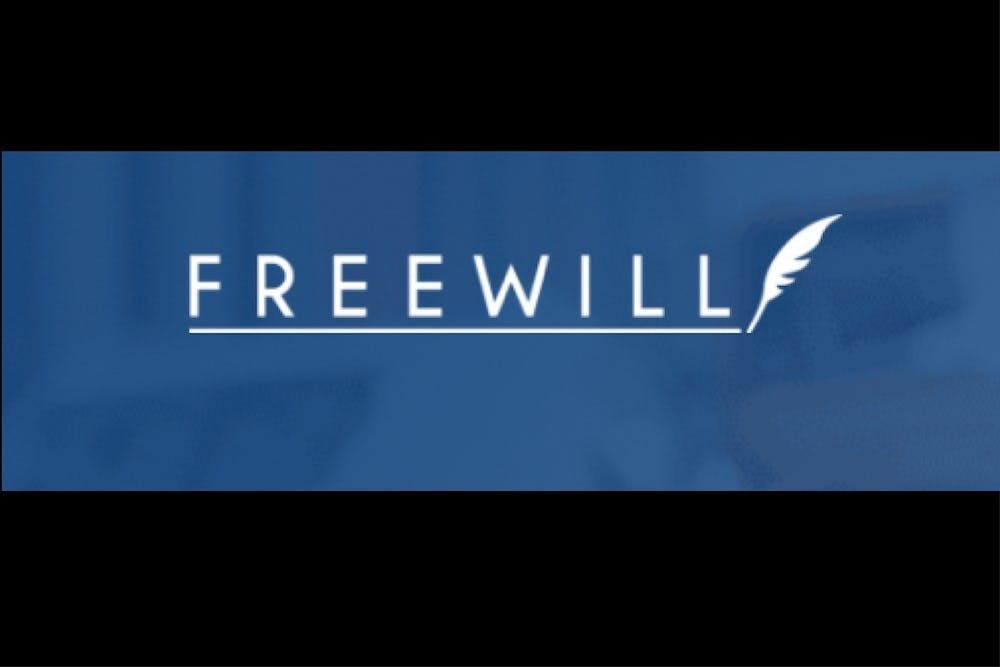For most people, the idea of financial planning is downright intimidating, requiring expensive legal fees and tough decisions. But a website developed by a Duke alum is working to make that process easier.
Helen Zou—Pratt ‘13 and currently pursuing an MBA/MA at Stanford University—co-founded FreeWill, a platform that streamlines estate planning and encourages charitable donations. Users are able to develop a legally-binding will at no cost, saving them both time and money. It also includes a tool that makes it more simple to leave behind gifts for nonprofits, charities and research institutions.
“Estate planning can be really complicated,” Zou said. “We broke that down into something easy and digestible.”
She explained that the website asks users if they want to leave money for nonprofits and lets them designate how much or what percentage of their assets they want to leave. Once they create their will, they can print it out and have two witnesses sign the document to make it official.
After only a year of operation, FreeWill has already amassed 1,700 users who have agreed to donate more than $30 million to charities.
The platform generates revenue through partnerships with nonprofits who buy customized versions of the will-making process and pay an annual subscription fee. FreeWill sends them notifications when users have made donations, allowing the nonprofits to track gifts and reach out to donors to thank them and build relationships.
The paying nonprofits are also displayed on the site as suggested charities to give donations, which Zou said increases the number of gifts they get. Users can also select an “other” option and type in the charity of their choice.
So far, the website has about 20 partners including the Texas Children’s Hospital and Project HEAL, which focuses on helping people suffering from eating disorders pay for treatment. Since partnering with FreeWill, Zou noted that Project HEAL has received increased traffic on its digital platforms and raised more than $1 million in pledges.
“A lot of it is making it simpler, easy and free,” Zou said. “How do you take something complex and scary and boil it down into something that people can find enjoyable and easy to understand?”
She noted that FreeWill has worked with attorneys across the country to examine state laws about wills, allowing the platform to capture variations in regulations in different places. For more complicated estate planning, users can make a draft will, including their desired charitable donations, and then work with a lawyer, which still helps streamline the process. It can also recommend qualified attorneys near users’ homes.
The idea for the website came about when Zou’s friend Patrick Schmitt, also a grad student at Stanford, was trying to write a will for himself and wanted to leave most of his money to charity but found the process to be difficult.
“We realized there was a huge opportunity around philanthropic giving,” Zou said. “How can we mitigate the loss to charities that happens when people aren’t thinking about giving in their will?”
Zou and Schmitt along with another Stanford graduate student researched the startup space and legal regulations before launching the website. They now have two full-time employees and a group of four to eight helping out part time.
Zhou's noted that she did not always plan to start a business. She studied biomedical engineering at Duke and planned to go to medical school but then decided she did not want to spend the rest of her life doing research.
“I realized that it wasn’t what I wanted to dedicate the rest of my life to,” she said. “Being a doctor you influence one life at a time. I wanted to see if I could do that on a larger scale.”
She then joined Capital One as a senior strategy associate and later a product manager, which she used as a launch pad to learn more about business.
Zou explained that FreeWill is important because it helps eliminate the reluctance around writing wills. Many people do not want to think about their deaths or meet with lawyers. Some also assume death is a long way off and don't see the incentive to write a will now.
“Everyone over 18 should have a will,” Zou said. “It’s a financial best practice of being ready for anything.”
Schmitt noted the potential for FreeWill to tap into an underutilized source for philanthropy. Although 90 percent of Americans make a donation to some cause once a year, fewer than six percent include charitable gifts in their estate plan.
“When people do estate planning, they’re rarely prompted to do charitable giving,” Schmitt said. “If you don't ask people about a certain thing, they’re much less likely to do it.”
FreeWill also helps users make sure their finances are in order and take care of their friends and family after the users die, Zou explained. On the website, users can designate possessions or funds that they want to leave behind for certain individuals.
Moving forward, Zou said she wants to reach out to more nonprofits to get them on board and serve as a resource to their donors. Their goal is to raise $100 billion for charities.
Schmitt added that he thinks FreeWill will be successful because of its brilliant team and the fact that most people do want to donate their money to good causes.
“People are fundamentally interested in changing the world,” he said. “They just need a clearer path to doing so.”
Get The Chronicle straight to your inbox
Signup for our weekly newsletter. Cancel at any time.

